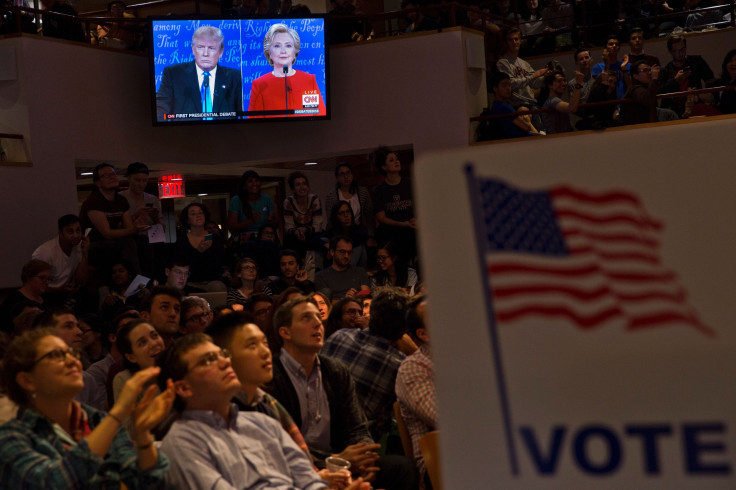Hillary Clinton Latest Millennial Polls: Young Voters In Swing States Say Democrat Won First Debate

Is Hillary Clinton close to solving her oft-reported "millennial problem"? Survey data released Thursday by Public Policy Polling showed that a majority of under-30 voters in swing states said they thought Clinton won the first presidential debate earlier this week — and that might begin to translate to greater support on Election Day.
In Colorado and Florida, nearly two-thirds of young respondents told PPP they thought Clinton won the debate. In North Carolina, 59 percent declared her the victor, and in each Pennsylvania and Virginia, 53 percent did.
"They overwhelmingly see Clinton as the winner, and they’re starting to vote for her in larger numbers than they had before," PPP director Tom Jensen wrote in the report.
The poll data backed up his theory. In match-ups where Trump and Clinton were the only two choices, young swing-state voters had the former secretary of state beating the tycoon by a minimum of 24 percentage points.
However, as Taylor Swift would say, Clinton's not out of the woods yet. The PPP data showed that when Libertarian Gary Johnson and Green Party candidate Jill Stein were included as candidate options alongside Clinton and Trump, the Democratic nominee's support almost always took a greater hit than the Republican's. The exception was Pennsylvania, where Trump lost 13 percentage points and Clinton lost 12 when young voters were asked about third-party candidates. In Virginia, Johnson actually beat out Trump for second place.
Clinton's rival in the primary, Vermont Sen. Bernie Sanders, was able to motivate huge numbers of millennials to the polls. Sanders has endorsed and campaigned with Clinton, but his backers still haven't quite embraced the nominee.
In such a close race, that could be an issue for the former first lady.
"Trump’s candidacy is built on the idea that he can run up the score with groups like older voters, so Clinton needs to be able to rely on a cushion among groups like millennials," Kristen Soltis Anderson, a GOP pollster and author, told the Guardian. "If millennials don’t find her to be adequately inspiring, there’s a chance that many of them decide to wash their hands of this whole election."
In any case, young voters wield a lot of power. The Center for Information and Research on Civic Learning and Engagement found earlier this year that millennials could have "a disproportionately high electoral impact" in states like Iowa, New Hampshire, Ohio, Wisconsin and Nevada.
© Copyright IBTimes 2024. All rights reserved.





















